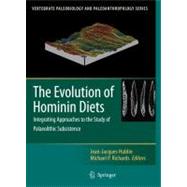
What is included with this book?
| The diets of non-human primates: frugivory, food processing, and food sharing | |
| The Energetics of Encephalization in Early Hominids | |
| Meals vs. snacks and the human dentition and diet during the Paleolithic | |
| Modern human physiology with respect to evolutionary adaptations that relate to diet in the past | |
| Hunting and hunting weapons of the Lower and Middle Paleolithic of Europe | |
| Neanderthal and modern human diet in Eastern Europe | |
| Hominin subsistence patterns during the Middle and Late Pleistocene in northwestern Europe | |
| Late Pleistocene subsistence strategies and resource intensification in Africa | |
| Seasonal Patterns of Prey Acquisition and Inter-group Competition During the Middle and Upper Paleolithic of the Southern Caucasus | |
| Epipaleolithic subsistence intensification in the southern Levant: the faunal evidence | |
| Paleolithic diet and the division of labor in Mediterranean Eurasia | |
| Moving north: archaeobotanical evidence for plant diet in Middle and Upper Paleolithic Europe | |
| Diet in early hominin species: a paleoenvironmental perspective | |
| The Impact of Projectile Weaponry on Late Pleistocene Hominin Evolution | |
| The evolution of the human capacity for "killing at a distance" | |
| An energetics perspective on the Neandertal record | |
| d13C values reflect aspects of primate ecology in addition to diet | |
| Increased Dietary Breadth in Early Hominin Evolution: Revisiting Arguments and Evidence with a Focus on Biogeochemical Contributions | |
| Neanderthal dietary habits: Review of the isotopic evidence | |
| Stable isotope evidence for European Upper Paleolithic human diets | |
| Table of Contents provided by Publisher. All Rights Reserved. |
The New copy of this book will include any supplemental materials advertised. Please check the title of the book to determine if it should include any access cards, study guides, lab manuals, CDs, etc.
The Used, Rental and eBook copies of this book are not guaranteed to include any supplemental materials. Typically, only the book itself is included. This is true even if the title states it includes any access cards, study guides, lab manuals, CDs, etc.